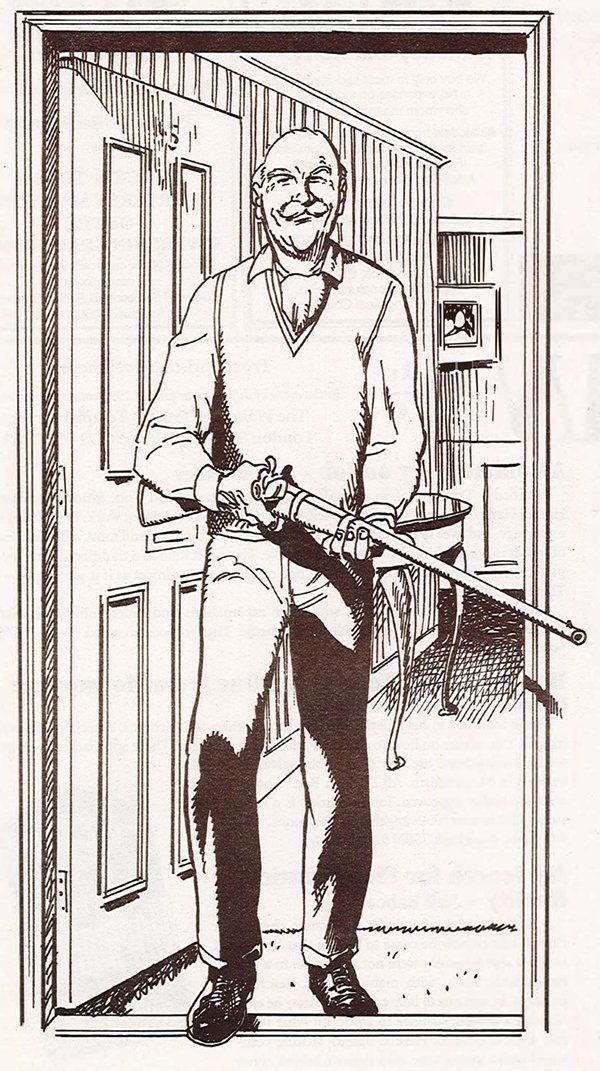
He met me at the door brandishing an old musket and sporting a twinkle in his eye. A bit cantankerous – and quite unpredictable – he rode eighty like a bronco. I liked his spirit!
Why is it that some age so beautifully, like antique furniture? Others crackle and snap with barely contained bitterness – as if advancing age is an approaching enemy to be fought off with the twin weapons of silence and sarcasm?
After visiting many saints of advanced maturity, I have come to a sobering, although not very profound, conclusion – a conclusion I remind myself of when I grump and groan. Attitudes adopted when we are younger either crater our pathway with potholes into which we keep stumbling, or smooth out the eroded track of advancing age.
Alice is a case in point. When she was stricken with a degenerative disease, her children reluctantly transferred her out of her cosy apartment into a care facility. My wife Mary Helen and I visited her several times. Although her memory faltered and ultimately collapsed, her sunny disposition shone through. Her eyes continued to twinkle with humour. Her concern for others still moved her to offer tea. A gentleness and compassion blessed all her conversation. The last time we visited she danced a little jig as we left.
Almost three millennia ago King Solomon wrote, ‘A cheerful heart is good medicine, but a crushed spirit dries up the bones … The cheerful heart has a continual feast’ (Proverbs 17:22; 15: 15). Attitudes profoundly affect health and happiness. Good attitudes learned in our formative years, and put into practice in our twenties and thirties, have enormous staying power. They anchor us when a fearful diagnosis shatters our calm. They lead our thoughts through spring meadows in the dead of winter. They grace our advancing years.
Even in maturity we can learn to jettison the junk and embrace uplifting attitudes. In his famous Sermon on the Mount, Jesus talked to people of mature age about what we call the ‘beatitudes’. I like to call them the ‘becoming attitudes’, because they so profoundly affect what we become. The Master captured in memorable prose the paradoxical connection between blessedness and humility. He talked about the relationship between joy and empathy with those who grieve, and between contentment and hunger for ethical excellence. He linked profound inner strength with an attitude of meekness – and so much more.
I have seen these attitudes in many who ride retirement with verve. From her wheelchair in the front row, Helen sang the hymns with obvious delight. Suddenly plunged into blindness by a baffling physical ailment, she had been forced to quit her job. Bypass surgery had already curtailed her husband Tad’s mobility around their spacious seaside bungalow. Their twin afflictions compelled them to sell their dream home and move into a sma11er house adapted to their limitations. Not content to sit home and mope, however, they both plunged into a busy whirl of activities geared to help other seniors.

Their trials were not over. In a fluke accident Helen broke her ankle. Treatment went awry. Instead of the simple healing expected, a year dragged by with her leg in a cast. But every Sunday I would look down from the pulpit and find her there beside her husband. Both radiated a thankful spirit.
How could Helen and Tad remain so positive in the face of their tarnished dreams? Attitudes! Although they had both come to saving faith in Christ later in life, they had quickly adopted his beatitudes as their charter. Before the bottom dropped out, they had woven their bright colours into the warp and woof of their life tapestry.
It’s too late when a crisis descends to call heaven with a list of the qualities we need to weather the storm – patience and resilience, confidence and hope, perspective and contentment. Nor can we pick them up like we might a course at evening class. We dare not wait for leisure time to cultivate these harbingers of happiness. They come to the person who looks to God in the rough and tumble of daily living. The joys and challenges of life are meant to help us develop a disposition that will enable us to glide through the advancing years on the wings of joyful optimism.
Oh, I know, God can do the impossible. He really can. He can make ‘Grumpy’ metamorphose into ‘Happy’, even at eighty. Still, let us not test the Lord’s patience by waiting to find out! Those who ride retirement with the most panache, bank more than money. Like Jim.
My mouth dropped open as Florence talked about her husband Jim. (Both tied the marriage knot in their seventies.) ‘My husband is the most Christ-like man I have ever met,’ she exclaimed. ‘When I first saw him-across the room-his face glowed. I knew then that this man was unusual. But when I learned about the tragic death of his daughter, followed shortly by the death of his wife, I was struck dumb.’
She continued, ‘He is so gentle. So thankful for others. So appreciative and thoughtful.’
Amazing! As I drove home, I asked myself how tragedy, instead of feeding angry bitterness or deep-seated resentment, had mellowed this man. I knew that for years he had been critical and aloof. Now, not only his wife but others remarked on his cheery personality. Jim is proof that a person can change – or be changed. Jim’s conversion had radically altered his outlook on life. Then, too, tragedy may have awakened a thirst for those beattitudes that so charmed his future wife.
Alice and Jim, Helen and Tad have illustrated, for me, a profound lesson. If I want to mellow as the years roll by, instead of becoming brittle and crabby, I need to ask the Holy Spirit to keep transforming my bad attitudes into be-attitudes.






